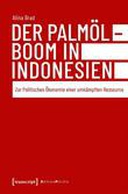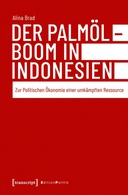Explore

Was haben Handcreme, Tiefkühlpizza und Waschmittel gemeinsam? Richtig: Sie enthalten Palmöl – wie bereits die Hälfte aller Supermarktprodukte. Doch wodurch wurde der atemberaubende Palmölboom mit seinen verheerenden sozialen und ökologischen Folgen in den Produktionsländern ausgelöst? Alina Brad untersucht die politischen und ökonomischen Triebkräfte, die den Aufstieg Indonesiens zum weltweit führenden Palmölproduzenten ermöglichten. Ausgehend von den historischen und polit-ökonomischen Bedingungen entschlüsselt sie das komplexe Geflecht von Interessen und Konflikten um Landkontrolle und Inwertsetzung im indonesischen Palmölsektor.
This book is made open access as part of the Knowledge Unlatched KU Open Services
This book is made open access as part of the Knowledge Unlatched KU Open Services
This book is included in DOAB.
Why read this book? Have your say.
You must be logged in to comment.
Rights Information
Are you the author or publisher of this work? If so, you can claim it as yours by registering as an Unglue.it rights holder.Downloads
This work has been downloaded 497 times via unglue.it ebook links.
- 142 - pdf (CC BY-NC-ND) at OAPEN Library.
- 189 - pdf (CC BY-NC-ND) at Unglue.it.
Keywords
- Asia
- Central government
- Central government policies
- Decentralisation
- Economic policy
- economy
- Environmental policy
- Globalization
- Indonesia
- KUnlatched
- Land Inspection
- Nature
- Non-sustainability
- Palm Oil
- Political ecology
- Political Science
- Political Science / Public Policy / Environmental Policy
- Politics
- Politics & government
- Resourc Politics
- Society & Social Sciences
- thema EDItEUR::J Society and Social Sciences::JP Politics and government::JPQ Central / national / federal government::JPQB Central / national / federal government policies
Links
DOI: 10.14361/9783839447574Editions


